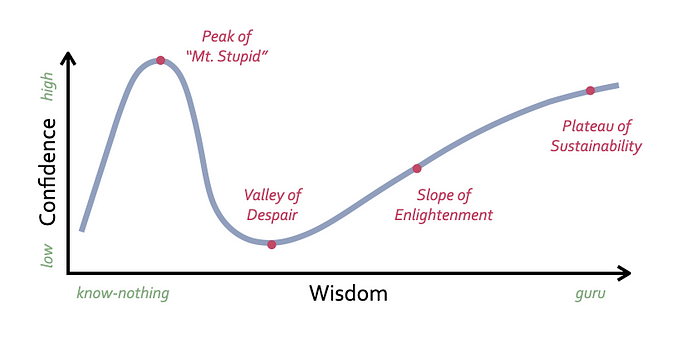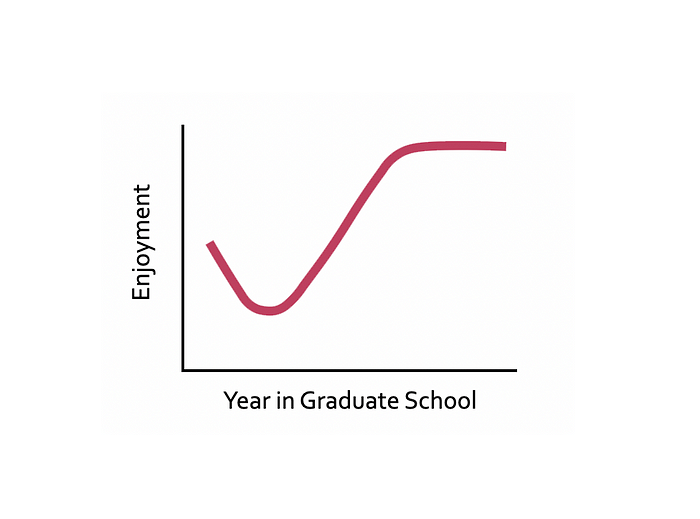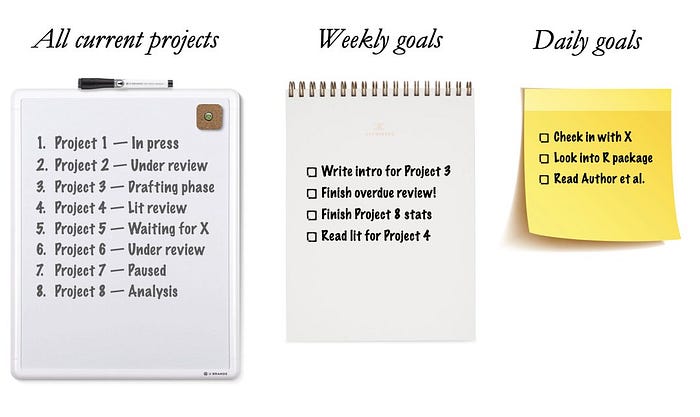Modest Advice for New Graduate Students
Throughout the course of my years in graduate school, I kept a running list of the best advice given to me, and the strategies that helped keep me sane. I hope it will prove useful to others.
1. The Phenomenology of Graduate School:
- Impostor Syndrome is 100% real and will affect you (yes, even you). But you can learn how to better manage it over time. The best cure is building up enough knowledge & experience that you start thinking, “Hey, maybe I do know what I’m talking about”. But please note that it takes time, and in the meanwhile, be kind and patient with yourself.
- Related to the point above, regardless of how much you know about your topic, there is much more that you do not know. Cultivate humility, learn from others, and don’t be afraid to admit you don’t know something. Real learning will not happen unless you commit to these goals. Below is a graph of the Dunning-Kruger effect to explain this phenomenon. There’s no reason you have to climb Mt. Stupid or experience the Valley of Despair; just start in the middle of the graph.

- Here’s a candid sketch of what my time in graduate school looked like (and maybe you’ll experience this, too).

- There is often excitement and a set of expectations when you first come in, but that might wear off as you come to learn more about the new circumstances you find yourself in — it’s harder/less challenging than you expected, your first few experiments don’t work, your peers seem to be ahead of you, you didn’t realize just how many drafts a paper has to go through before it’s published (take whatever number you’re thinking of and multiply it by 10), etc. These thoughts are hard to avoid, and it’s possible you’ll experience a bit of a slump in your early years, like I did. It really is very difficult to figure out whether the dissatisfaction you may feel in graduate school is a temporary state of being, or indicative of a larger problem. This is something you have to figure out for yourself. But, in my experience, it’s not unusual to feel like this early on; there is usually a calibration process that takes place (as such, this curve can probably be applied to most new changes, like learning a new skill or moving to a new city). Over time, as you begin to hone your skills, build your body of knowledge, explore new ideas, and make it through the publication process a few times, you may find that you enjoy it more.
- As you move up in academia, you will have more and more responsibility. This can seem daunting, at first, but it’s important to remember that you are leveling up, as well. You probably can’t accurately forecast how well you will do in the face of increasing pressure, because we are notoriously bad at predicting how much we will change in the future (known as the end-of-history illusion).
2. The Critical Importance of Mental Health Care:
- The mental life of most graduate students is challenging; they are, on average, more than six times more likely to experience depression & anxiety as compared to the general population. Luckily, many programs offer resources for mental health care. Do not let this go to waste; seek it out, early and often! Even if you think you “don’t need it”, or that it will be difficult to set up. This investment is absolutely critical; your mental health should be a top priority.
- Get 8 hours of sleep a night. Non-negotiable. There is no need for all-nighters, now or ever. Your sleeping habits directly influence your mental health. Do not sacrifice your mental health for any reason.
3. Advisory Relationship:
- You should have a discussion with your advisor very early on about your career goals. By this, I mean, you should talk openly about whether or not you are planning to pursue a tenure-track research position, a teaching position at a SLAC (small, liberal arts college), an “alt-ac” career in industry, or any other goal. This will significantly change the types of priorities you should have through graduate school. No one will know for sure what they want at first, but this dialogue should be ongoing. I would advise you to always have back-up plans, and not paint yourself into a corner. If interested in pursuing alt-ac jobs, you should spend some time looking for internships or other means of work experience while still in graduate school (many of these internships take place over the summer, and in some cases are converted into full-time positions following graduation).
- Show up to your advisory meetings with a clear agenda, starting with things that are most time-sensitive. Your advisors are busy and may not have the time to be as involved as they want to be in your life. Make it easy for them. Same with emails that you are sending out. If it’s longer than two paragraphs: stop and delete the whole thing. Set up a meeting instead. [2021 Update: Also — don’t hesitate to send reminder emails for things like recommendation letter deadlines. No one thinks you’re being annoying; everyone is truly just extremely busy.]
- Relatedly, as Steve Stearns urges: “You had better decide early on that you are in charge of your program. The degree you get is yours to create. Your adviser can advise you and protect you to a certain extent from bureaucratic and financial demons, but [they] should not tell you what to do. That is up to you. If you need advice, ask for it: that’s [their] job.” Read the rest of his advice here (though I would recommend taking the “No one cares about you” statement with a grain of salt).
4. Work-Life Balance:
- This might surprise you, but: few people are working as hard as they claim they are. There is this weird culture in academia centered around how many hours a week people work. I’m not saying you won’t have to work hard or that others don’t work hard, but take what you hear from other people with a grain of salt. Relatedly, given that there’s so much flexibility in how to get work done, there are many ways to successfully pull it off. Someone else’s method may not work for you. Don’t let it get to you, and honestly, just try to avoid these types of comparisons, in general.
- Try as much as possible to maintain a work-life balance. I try to work during business hours (M-F, 9–5) and don’t strain myself too much on weekends and nights. That flexible time can be useful when big deadlines are coming up, but otherwise I would leave that time for non-academic things: intramural sports, art, movies, spending time with loved ones, etc. If you do not work hard to maintain this balance, I can pretty much guarantee you will burn out. It doesn’t have to be business hours, per se, but you should be mindful of not only how many hours you actually work, but how many hours a week you expect yourself to work. A friend of mine told me that he views all night-time and weekend work as a bonus; if it happens, great, but it shouldn’t be expected.
- 2021 Update: I’ve also written a short post about finding your “productivity equilibrium” in academia which you may find helpful.
5. Rejection & Competition:
- Academic life is absolutely full of rejection. I guarantee you will have papers, grants, and abstracts rejected (or, put in a nicer way, “not accepted”). At first, it might be hard to dissociate this feeling of academic rejection from a feeling of personal rejection, especially since, as a hard worker and successful student, a big part of your identity has come from academic success. This is a hard process, emotionally, but the sooner you realize it’s not personal, the better you can handle these rejections. Most successful academics, upon having an article rejected, for example, will say something like “Bummer. Okay, where should we submit next?” or “Well, that sucks. I wonder how I can update this paper to make it stronger?”. They do not dwell on the rejection; they shrug it off and try to learn from it. This should be your goal, and it will be hard to attain it, but each new rejection will eventually sting a little less than the last one, and over time, you will build up something like immunity.
- Other people’s successes are not your failures. Try as much as possible not to compete with your peers. Don’t undermine them, don’t put them down, don’t be upset when they succeed. Foster a support network, based on care and trust. Help them and they will help you. Share materials with each other, read each other’s papers, study together. They will be your colleagues, now and forever. Success in academia hinges upon long-term collaborative interactions. Be kind, be cooperative, be thoughtful.
6. Conferences & Presentations:
- Conferences are great for meeting awesome people. Start horizontally, meeting other graduate students and post-docs; they are your “extended cohort”. It’s always really helpful to be in a collaborative network of people in the same career stage as you. I would avoid the temptation to meet people just for the sake of “getting your name out there” or “networking”. This doesn’t work well in academia, and for good reason. You should prioritize meeting people whose work you are familiar with or have questions for, and talk to them like they are real people and not just a means to an end for your academic ambitions.
- At conferences, you should also attend as many talks as you can that seem relevant to you, and even some that don’t seem relevant! You’d be surprised how much you can learn from topics outside of your range of interest. I am a total conference nerd, and set up a schedule for myself ahead of time after looking through abstracts. Conferences are fantastic places for catching up on new work and potentially forming new research questions. Some conferences may also offer financial aid or support for graduate students; look into these and apply if you’re eligible!
- You should begin submitting abstracts for posters as early as you have results worthy of sharing. Remember that posters are visual abstracts! You can decide at what point you want to switch to giving conference talks. Your advisor can help you gauge this. One thing to keep in mind, however, is the old saying “every talk is a job talk”. Present research you want to be known for, and practice your talk many, many times beforehand.
- When it comes to presentations, there are a couple things to keep in mind. First, your slides should have very little text. The slides themselves should be clean and feature relevant graphics, like graphs, tables, photos, or videos (videos are good!). Do not excessively use transitions.
- And second, present your slides as if you are having a conversation with the audience. I am vehemently against scripts, either read-out-loud or memorized, though I grant that this is discipline-specific. For each slide, you should know the main points you want to make and add them to your presenter notes. You should practice as many times as you can prior to presenting your slides, but again, don’t memorize what you’re going to say. Try to speak as naturally and organically as possible. There are few things quite as unengaging as a presenter reading off slides or a script. Talk to specific people in the audience. Use a slide advancer so your hands are freed up for non-verbal communication. If you can, avoid standing behind the podium.
- If you have debilitating stage fright or presentation anxiety, I would recommend talking to your doctor about whether you’re a good candidate for beta blockers, such as propranolol. Many people, including myself, use this to help make public speaking less scary.
7. Software, Digital Organization, Statistics:
- Start learning R. Right now. Download RStudio, sign up for a Coursera course, or even better, enroll in a statistics course in your university that teaches using R. The sooner you get comfortable using R, the better. Don’t limit yourself to base R, either. There are a ton of extremely useful & efficient packages (such as tidyverse) that will make coding much easier.
- Acquaint yourself with the statistical renaissance happening in science (known broadly as Open Science). Learn more about questionable research practices (QRPs), and talk to your advisor and lab about best practices, data sharing, and pre-registration.
- Back up your files! I would recommend working out of Google Drive or Dropbox (Google Drive is particularly useful since they have partnered with many universities to provide unlimited storage). Once every few months, you should also back up to an external hard drive.
- Do not manually cite anything in your manuscripts, ever. Download citation software like Zotero, Mendeley, or Endnote (listed in order of best to worst, in my opinion). Take a day or two to learn it and mess around with it.
- Keep your files organized. Each project should have its own folder, as should every class. Manuscripts should be named in ways that immediately let you know which project and version that specific file refers to. I usually name manuscripts like so “SES&Prefs_Feb16”, and update the date in the file name. Whatever you use, use it consistently. You can even look into version control software. Importantly, please remember that whoever you are sending that document to is going to download it and have that file on their computer. Do not name things “Manuscript” or “Final Draft”; that means nothing to the person receiving it. If you are offering edits or updating a document someone else has written, it is customary to rename the file with your initials at the end like “SES&Prefs_Feb16_DA”.
- 2021 Update: I now use Google Docs for all manuscript drafting. Much preferable to Word, in my opinion. I installed the Zotero plug-in which lets me cite in Google Docs. Overall, a much easier way to edit and share manuscripts with collaborators, plus it comes with built-in version control.
- The same suggestion applies to papers you are downloading. I usually name papers I download like “Author Last Name — Title of Paper”. This makes it easier to find and send.
- If you are doing a literature review or reading through papers relevant to your thesis, I would recommend a system that helps you keep track of what you’re reading. For my thesis, I had a literature review document that kept track of the author, title, brief summary of the paper, and related tags. The tags were very useful because I could then use the “Sort” function in Excel to isolate what I wanted to cite.

8. Digital Networking:
- Build a website and curate your online presence. As the saying goes, “If you don’t do it, Google search will do it for you”. Many universities offer free hosting for students. If you feel like paying extra for a nicer website, Wix is the best platform, in my opinion.
- Start a CV and update it regularly. You may not want to post it until you have some publications (this is up to you), but it should be available as you enter your last three years. Use other academics’ CVs as a model of what to include, and look up resources for how to best structure it. Your advisor should be able to help with this, too.
- Consider joining academic Twitter; it’s a great way to keep up with the literature and emerging trends in scientific discourse.
9. Strategic Planning!
- It may be a bit difficult to keep track of all the many things on your to-do list. You also might find yourself determining your agenda by what deadline is coming up or what is in your inbox that morning. Generally not a bad strategy, but I find that unless you’re consciously and actively determining your priorities, projects that are important (like projects you yourself are leading) are the ones that are more likely to get ignored (easier to disappoint yourself than others!).
- Here’s where strategic planning comes in. This is the system I use to organize my tasks and track goals at three different levels of resolution: (1) an overview of all active projects, (2) weekly goals, and (3) daily goals.

- It’s a bit hard to have abstract goals like “finish this manuscript”, especially when it comes to academic writing. The idea here is to break goals down into actionable tasks at different levels of resolution and keep track of them accordingly.
- Accordingly, I also have a Google calendar called “Actionable Tasks”, in which I literally schedule in weekly & daily goals in between my other events. I usually do this planning on Monday mornings. I’m not perfect about sticking to it (I move events a lot), but it helps me feel organized!
